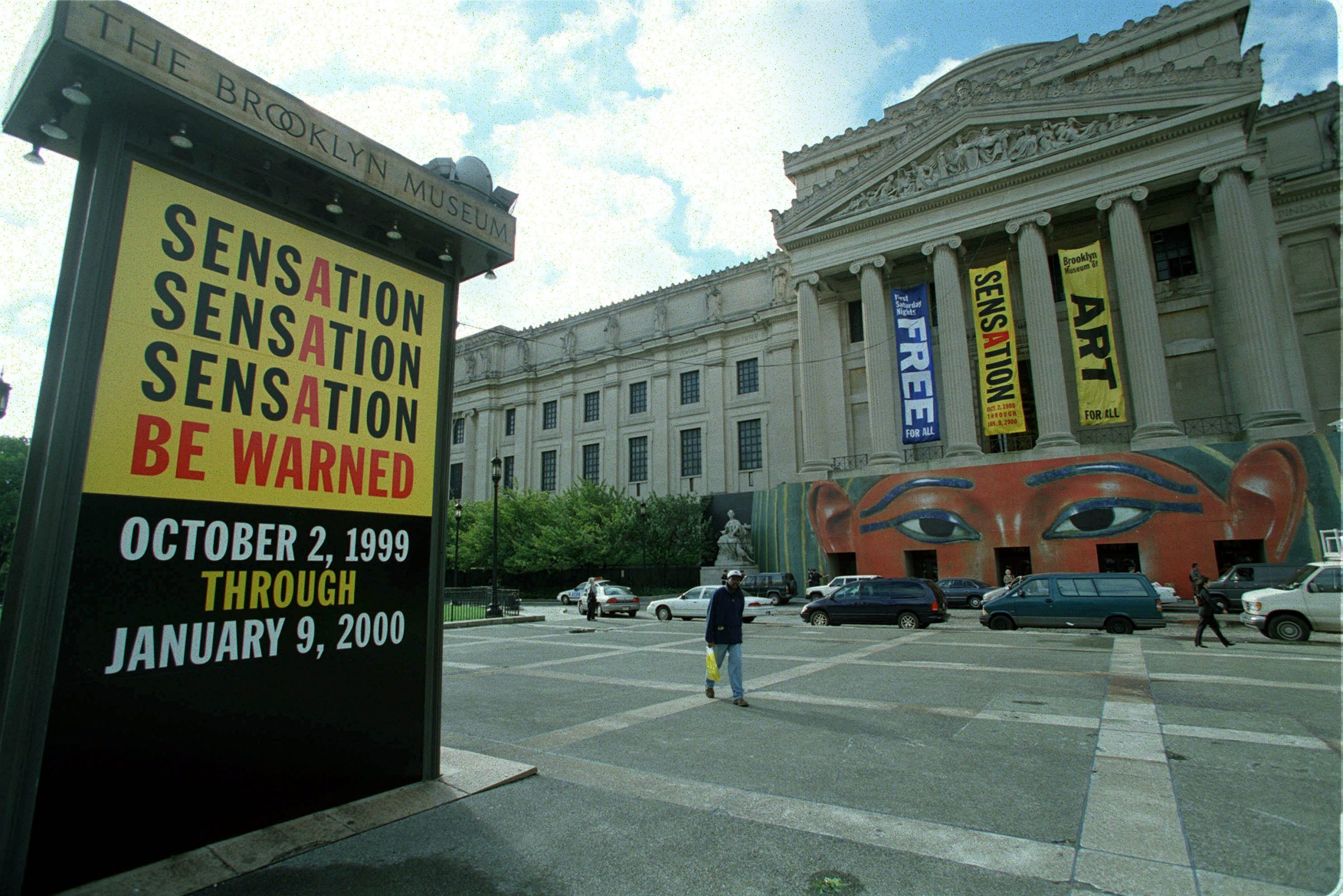
In September 1999, New York City mayor Rudy Giuliani threatened to terminate the lease of the Brooklyn Museum of Art for hosting an exhibition so scandalous and provocative that minors could only attend if they were accompanied by an adult.
“Sensation: Young British Artists From the Saatchi Collection” had debuted at the Royal Academy of Art in London two years earlier, where iconoclastic installations, including a bust made from frozen blood and a gutted pig preserved in a tank of formaldehyde, were met with virulent protests. Among the most controversial was religious painting by Chris Ofili called The Holy Virgin Mary, which caused a scandal for its use of collaged pornography and elephant excrement.
Unsurprisingly, the work caused a storm among American Catholics—Mayor Giuliani included. At a press conference, the Republican politician argued that the R-rated exhibition violated the Brooklyn Museum’s lease agreement, which supposedly stated that museums housed in city-owned buildings “shall at all reasonable times be free, open and accessible… to the general public on such terms of admission as the Mayor” sees fit.
Chris Ofili, The Holy Virgin Mary (1996) at the Brooklyn Museum. Photo by Doug Kanter / AFP via Getty Images.
“Last time I checked, I’m the Mayor,” Giuliani said, “and I don’t find closing down access to a public museum consistent with the use of taxpayer dollars. People have an absolute right to express anything they want to express, but they do not have an absolute right to have that funded by the taxpayers.”
Giuliani was not alone in his distaste of “Sensation.” Thomas V. Daily, bishop of the Diocese of Brooklyn, agreed the exhibition could not be supported by public funds. Howard Golden, Brooklyn Borough President, and Peter F. Vallone, Democratic Speaker of the City Council, also found “Sensation” offensive.
Tamsin Blanchard, arts correspondent for The Independent, recorded equally impassioned responses from Londoners, including an attack on Marcus Harvey‘s painting of a serial killer: “First red and blue Indian ink, then an egg, were smuggled through the security cordons and hurled on to the controversial painting of Myra Hindley. Before that we had shattered glass, megaphones, placards, images of media manipulation, tears, confusion and bewilderment. And that was just in the courtyard.”
Management of the Brooklyn Museum stood firm, with director Arnold L. Lehman refusing to call off the show or opening it to minors. “First, we are told how vile and degenerate the exhibition is, and now we are being expected to open it up to children?” he said in an interview. “The Mayor is sending a mixed message that we obviously need to sort out.”
The museum took Giuliani to court in a First Amendment lawsuit, while Giuliani turned to the state court to evict the institution from its Eastern Parkway home. Both cases were dropped the following spring after a cornered Giuliani abandoned his initial threats.
Although the mayor did not pursue legal action, he continued to voice his disagreement with “Sensation,” specifically Ofili’s Holy Virgin. “Anything that I can do isn’t art,” he said. “If I can do it, it’s not art, because I’m not much of an artist. And I could figure out how to put this together. You know, if you want to throw dung at something, I could figure out how to do that.”
The saga received a latent bookend in April 2018, when billionaire hedge fund manager and art collector Steve Cohen donated Holy Virgin, which he had purchased at a Christie’s auction in 2015 for $4.5 million, to the Museum of Modern Art, giving the work a permanent place in the city that once sought to expel it.
What’s the deal with Leonardo’s harpsichord-viola? Why were Impressionists obsessed with the color purple? Art Bites brings you a surprising fact, lesser-known anecdote, or curious event from art history. These delightful nuggets shed light on the lives of famed artists and decode their practices, while adding new layers of intrigue to celebrated masterpieces.